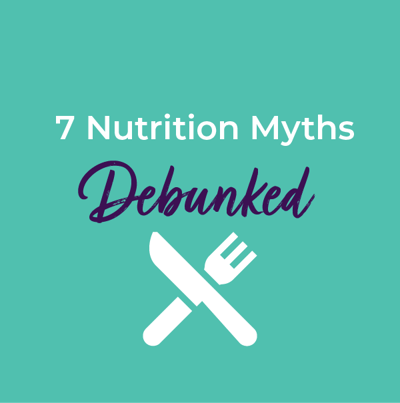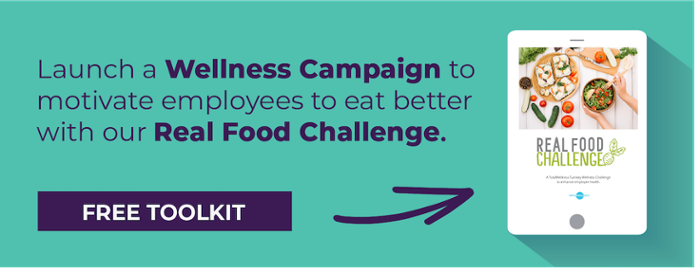 We’ve all gotten bad nutritional advice from time to time.
We’ve all gotten bad nutritional advice from time to time.
With the wealth of information out there, it can sometimes feel overwhelming to sort through and choose what to apply to our lives. That’s especially true when it comes to nutrition and diets in particular.
Keto diet. Paleo diet. Vegan diet. Plant-based diet.
Eat this. Don’t eat that. Sugar is bad. Bread is ok.
It’s enough to make even the most internet-savvy researcher’s head spin.
This post will examine several nutrition myths and discuss the truth behind the most common nutrition fallacies like, "To lose weight, you have to give up all of your favorite foods."
Here we break down some of the most common nutrition myths out there.
Myth #1: Eating Many Small Meals a Day Increases Metabolism
You may have heard that eating several small meals daily will keep your metabolism up. In reality, smaller meals may make you hungry sooner, which could lead to eating too much or making unhealthy “quick fix” choices. The thermic effect is when digestion raises metabolism slightly. The amount of the thermic effect is based on the amount of food consumed, not how often it’s eaten.
Mythbuster: While digestion may slightly increase your metabolism, your meal frequency is less important to watch than your total daily calorie count. Eating more often won’t increase the number of calories burned or up your overall metabolic rate.
Myth #2: Fats are Unhealthy
If you want to lose weight, perhaps the first food item you’ve decided to nix is fat. But, your body still needs good fats to run properly. The only truly bad fats are trans fats and saturated fats. In fact, artificial trans fats — known as partially hydrogenated oils — were banned in the U.S. in 2015 with manufacturers phasing out its use last summer.
Mythbuster: Your body needs some fats like monounsaturated fatty acids (found in oils and foods), omega-3 (fatty fish), and polyunsaturated fatty acids (found in oils and plant-based foods). A totally fat-free diet is not healthy to maintain. Avoid trans-fat and limit saturated fat to 10% or less daily.
Myth #3: Carbs are Bad For You
This is a blanket statement that can’t be applied to all carbs. Carbohydrates are not necessarily fattening, but lower-quality refined carbs may have more calories and sugar. Think dessert, pretzels, white bread, rice, and pasta. Carbs should make up about 40-45 percent of your daily caloric intake. If cutting back on processed carbs, make sure you don’t replace those calories with less healthy foods or increase your overall calories.
Mythbuster: Not all carbs are evil. If you want some carbs, instead opt for fiber-filled carbs like brown rice which will require less insulin, keeps you fuller longer, and raises glucose levels more slowly.
Myth #4: Only Eat Egg Whites
Egg yolks have been thought to cause heart disease due to cholesterol. While some studies have found that it may potentially increase heart disease for diabetics, there’s still a need for more research. The good news is if you’re healthy and love eggs, go for it. Some studies have found that healthy individuals eating up to seven eggs weekly can potentially prevent macular degeneration or certain strokes.
Mythbuster: Eggs have a ton of nutrients that are located mainly in the yolk. If you want to skip the cholesterol, just eat the egg whites. The whites still have protein and are filling.
Myth #5: Everyone Should Eat Breakfast
For years, you've probably heard the saying, “Eat breakfast like a king,” meaning make it your biggest meal of the day. While some people should never go without breakfast, others who aren’t big on breakfast shouldn’t force the issue. Some studies have shown that breakfast is actually a personal preference. While some overcompensate during the rest of the day if they don’t eat breakfast, others gained weight when adding breakfast into their routine!
Note: A healthy breakfast is a good idea for diabetics and others concerned about blood sugar levels.
Mythbuster: The bottom line is doing what works for you. If you’re not hungry in the morning, you might not need breakfast. If you do skip breakfast, just be sure to make up for your daily fruit and veggie recommendations with the rest of your meals.
Myth #6: Fresh Produce Has More Nutrients
While fresh produce may be more delicious, it doesn’t mean it’s necessarily more nutritious. Even if you prefer to buy produce from your local farmer’s market or produce stand, there’s nothing wrong with frozen produce. Canned produce, on the other hand, is processed and can break down important nutrients. Added salt and sugar are also a concern when consumers purchase canned goods, especially if trying to avoid excessive amounts of those ingredients.
Mythbuster: Frozen options are foods that are generally picked to maintain as many nutrients as possible. One study even found in some instances that frozen produce is actually more nutritious than its 5-day fresh-stored option.
Myth #7: Losing Weight Means Giving Up Favorite Foods
Unfortunately, 95% of dieters gain lost weight back in one to five years. By nature, diets are temporary food plans. So once you’re “off” your diet, you may fall back into the same eating patterns as before — and gain more weight. Fad diets may be restrictive in necessary nutrients, which can cause low energy, mood swings, and create other health issues. By taking the pleasure out of eating, it results in an unstainable diet. Instead, focusing on a balanced diet and listening to your body’s needs works best.
Mythbuster: To lose weight, skip withholding food. Try to put your focus on developing life-long, healthy eating habits. These will feel more enjoyable and sustainable when you make diet changes that lead to feeling better and healthier.
Do Your Own Research and Debunk Nutrition Myths
It's easy to get caught up in the latest health and nutrition “rules.”
Whether a new nutrition rule pops up in a conversation, news report, or Facebook story, it can sometimes be challenging to separate fact from fiction. When in doubt, you can always ask your doctor or do some research on reputable websites like the Mayo Clinic and other health organization platforms.
It’s tough to keep it all straight when new studies come out all the time. Your best bet is to seek out a medical professional for the most updated advice — especially when it comes to your individual health plan.
Want more nutrition-related articles? Here are a few to check out:
- Here’s Why You Want Your Employees to Eat Well
- 7 Healthy Snacks for Work to Supercharge Your Day
- Want to Boost Your Overall Health in the New Year? Try This Diet
- 7 Healthy Eating Habits That Will Change the Way You Eat
If you love our nutrition content, let us know. Feel free to comment to let us know what topics you’d like us to cover in upcoming blogs!
Which nutrition myths surprised you the most? Let us know in the comments below?



